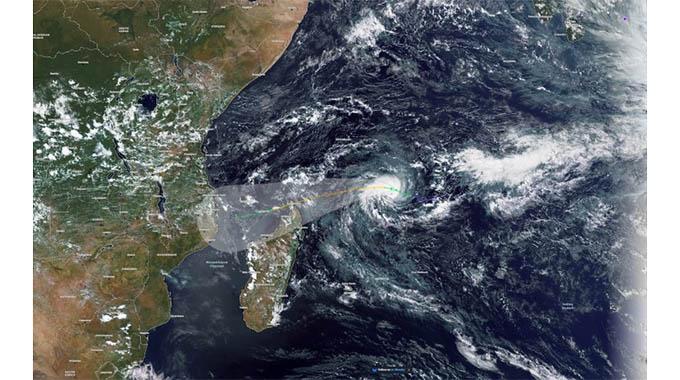News / National
Zimbabwe braces for Cyclone Chido's impact
15 Dec 2024 at 09:13hrs |
0 Views

Tropical Cyclone Chido is expected to reach Zimbabwe tomorrow afternoon, bringing strong winds and heavy rains, with authorities on high alert to mitigate potential damage and loss of life.
Forecasts indicate the cyclone will primarily affect Matabeleland North, Matabeleland South, Masvingo, Midlands, and Harare provinces. Winds averaging 50 km/h and torrential rains are expected, although the storm's overall impact in Zimbabwe is projected to be less severe than in neighboring countries.
The Civil Protection Unit (CPU) has activated emergency response systems to safeguard vulnerable communities. CPU Director Mr. Nathan Nkomo said on Friday that preparations were well underway, with evacuation points being established in cyclone-prone areas.
"Cyclone Chido will bring much-needed rain, but it is unfortunate that cyclones cause disasters," said Mr. Nkomo. "Cabinet has already approved our disaster response budget, and we are on high alert across affected areas to minimize the cyclone's impact."
Cyclone Chido, currently over Madagascar with winds of up to 220 km/h, is expected to weaken as it moves inland. It will make landfall on Mozambique's coast today with winds of approximately 155 km/h, then weaken further as it passes through southern Malawi before reaching Zimbabwe with wind speeds reduced to 45–50 km/h.
The Meteorological Services Department (MSD) anticipates the cyclone's effects to begin in Zimbabwe around noon tomorrow and extend into Monday. Heavy rains could lead to flash flooding, with wind gusts potentially causing localized damage, such as uprooted trees and roof damage.
MSD Head of Forecasting Mr. James Ngoma emphasized the need for caution: "While the cyclone will weaken significantly upon reaching Zimbabwe, its winds and rains could still disrupt infrastructure and cause flooding in low-lying areas."
The United Nations Office for the Coordination of Humanitarian Affairs (OCHA) estimates that approximately 2.7 million people across six Southern African countries will be affected by Cyclone Chido. The hardest-hit areas are expected to include Mozambique, Malawi, and parts of Madagascar.
In Mozambique, where the cyclone will first make landfall near Pemba in Cabo Delgado province, winds exceeding 120 km/h and rainfall of up to 200mm in 24 hours are forecast, putting 1.7 million people at risk.
Other Southern African nations, including Zambia and Botswana, are also expected to experience significant rainfall linked to the storm. Thunderstorms originating from Botswana are already bringing continuous rainfall to Zimbabwe ahead of the cyclone's arrival.
Cyclone Chido's anticipated arrival comes as Zimbabwe continues to recover from past storms, such as Cyclone Idai in 2019, which caused widespread devastation in Chimanimani and Chipinge, claiming hundreds of lives. Cyclone Filip, which impacted Chipinge in March this year, served as a less severe reminder of the region's vulnerability to tropical storms.
As Cyclone Chido approaches, authorities urge residents in affected provinces to remain vigilant and adhere to safety advisories. The CPU continues to coordinate with local stakeholders to ensure swift responses to any emergencies.
Forecasts indicate the cyclone will primarily affect Matabeleland North, Matabeleland South, Masvingo, Midlands, and Harare provinces. Winds averaging 50 km/h and torrential rains are expected, although the storm's overall impact in Zimbabwe is projected to be less severe than in neighboring countries.
The Civil Protection Unit (CPU) has activated emergency response systems to safeguard vulnerable communities. CPU Director Mr. Nathan Nkomo said on Friday that preparations were well underway, with evacuation points being established in cyclone-prone areas.
"Cyclone Chido will bring much-needed rain, but it is unfortunate that cyclones cause disasters," said Mr. Nkomo. "Cabinet has already approved our disaster response budget, and we are on high alert across affected areas to minimize the cyclone's impact."
Cyclone Chido, currently over Madagascar with winds of up to 220 km/h, is expected to weaken as it moves inland. It will make landfall on Mozambique's coast today with winds of approximately 155 km/h, then weaken further as it passes through southern Malawi before reaching Zimbabwe with wind speeds reduced to 45–50 km/h.
The Meteorological Services Department (MSD) anticipates the cyclone's effects to begin in Zimbabwe around noon tomorrow and extend into Monday. Heavy rains could lead to flash flooding, with wind gusts potentially causing localized damage, such as uprooted trees and roof damage.
MSD Head of Forecasting Mr. James Ngoma emphasized the need for caution: "While the cyclone will weaken significantly upon reaching Zimbabwe, its winds and rains could still disrupt infrastructure and cause flooding in low-lying areas."
The United Nations Office for the Coordination of Humanitarian Affairs (OCHA) estimates that approximately 2.7 million people across six Southern African countries will be affected by Cyclone Chido. The hardest-hit areas are expected to include Mozambique, Malawi, and parts of Madagascar.
In Mozambique, where the cyclone will first make landfall near Pemba in Cabo Delgado province, winds exceeding 120 km/h and rainfall of up to 200mm in 24 hours are forecast, putting 1.7 million people at risk.
Other Southern African nations, including Zambia and Botswana, are also expected to experience significant rainfall linked to the storm. Thunderstorms originating from Botswana are already bringing continuous rainfall to Zimbabwe ahead of the cyclone's arrival.
Cyclone Chido's anticipated arrival comes as Zimbabwe continues to recover from past storms, such as Cyclone Idai in 2019, which caused widespread devastation in Chimanimani and Chipinge, claiming hundreds of lives. Cyclone Filip, which impacted Chipinge in March this year, served as a less severe reminder of the region's vulnerability to tropical storms.
As Cyclone Chido approaches, authorities urge residents in affected provinces to remain vigilant and adhere to safety advisories. The CPU continues to coordinate with local stakeholders to ensure swift responses to any emergencies.
Source - The Sunday Mail
Join the discussion
Loading comments…


































